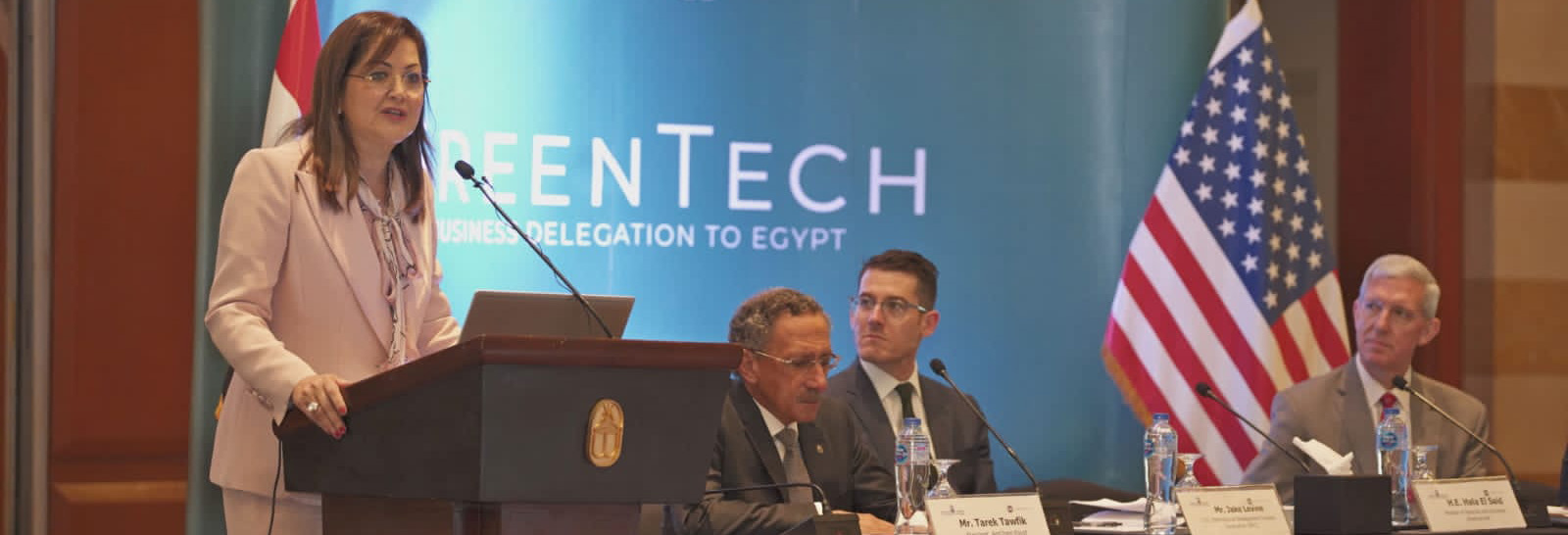Egypt’s Planning Minister meets a delegation of US institutions working in the field of green energy investment

15 May 2022
Dr. Hala El-Said, Minister of Planning and Economic Development who is also acting as the Chairperson of the Board of Directors of The Sovereign Fund of Egypt (TSFE) met on Sunday US delegation representing institutions working in the field of green energy investment during its visit to Egypt, which was organized by the American Chamber of Commerce in Cairo (AmCham Egypt).
The aforementioned meeting came in the context of Egypt's hosting of the COP 27 Climate Summit that is planned to take place next November in Sharm El-Sheikh. The delegation includes representatives from the US Export Bank, the US Agency for International Development (USAID), and many financing institutions and institutions working in the US green sector.The delegation was led by Marty Durbin, Senior Vice President for Policy at the Global Energy Institute, the US Chamber of Commerce, with David Thorne, Senior Advisor in the Office of the US Special Presidential Envoy for Climate, Jake Levine, Senior Climate Officer at the US International Development Finance Corporation, and Tarek Tawfik, President of the American Chamber of Commerce in Cairo (AmCham Egypt). and Ayman Soliman, Executive Director of TSFE, and representatives of the Chamber in Egypt, the United States of America, and the Egyptian American Business Council.
During her speech, Dr. Hala El-Said reviewed the tasks of the Ministry of Planning and Economic Development and the files responsible for it, noting the development and coordination of Egypt's Vision 2030 in cooperation with all partners to be compatible with the UN goals for sustainable development and Africa's Agenda 2063.
El-Said added that the ministry is also working on setting short, medium, and long-term plans for the state and distributing public investments to various ministries to achieve annual goals and plans.
El-Said referred to the Ministry's macroeconomic unit, which monitors and evaluates economic policies and issues recommendations to the government.El-Said also mentioned some agencies affiliated with the ministry, including the Central Agency for Public Mobilization and Statistics (CAPMAS), the Institute of National Planning (INP), and the National Institute for Governance and Sustainable Development (NIGSD).
El-Said explained that the economic reform program launched by Egypt in 2016; focuses mainly on the financial and monetary side of the economy.
This helped provide fiscal space and thus mitigate the impact of the repercussions of the Corona pandemic on the economy, in addition to adopting a balanced approach by paying attention to the health of the population, which was a priority for the state, while maintaining at the same time advancing the wheel of economic development.El-Said said that the state-supported many sectors during the pandemic to preserve employment and turn the wheel of economic activity.El-Said indicated that Egypt was able to achieve a growth rate of about 3.3% in 2020/2021 despite Corona, an unemployment rate of 7.4%, and a reasonable inflation rate at that time of about 5% annually.El-Said pointed out that this was coupled with a successful economic reform program and increased investment in infrastructure.El-Said said that the state seeks to upgrade the level of infrastructure in Egypt, as investment has been made in roads, ports, and electricity, as well as in digital infrastructure and industrial complexes, which opens the way for local and international investors. El-Said referred to the amendment of some laws and legislation related to investment, such as the Industrial Licensing Law and the new Investment Law, intending to improve the business environment.El-Said also highlighted the National Structural Reform Program (NSRP), which focuses mainly on increasing the relative weight of the industry, agriculture, communications, and information technology sectors in the economy, in addition to improving the efficiency of the labor market.
On The Sovereign Fund of Egypt (TSFE); The Minister of Planning and Economic Development said that the fund is working to create unique investment opportunities by exploiting untapped assets and investing in infrastructure.El-Said explained that the fund has established four sub-funds in the areas of financial services and digital transformation, the Utilities and Infrastructure Fund, the Health Services and Pharmaceutical Industries Fund, and another for tourism and real estate investment.
The fund is also involved in many projects promoting renewable energy, especially green hydrogen.
El-Said indicated that 6 (MoUs) were signed with the Suez Canal Economic Zone for green hydrogen and green ammonia projects, and the fund is also working on water desalination projects and industrial settlement. The fund also joined the "One Planet" initiative launched by French President Macron to invest in green projects.El-Said affirmed Egypt's full readiness to host the COP 27 climate summit, which is a good opportunity for cooperation and partnerships, expanding the scope of collective green recovery, and mobilizing all stakeholders to actively participate in climate action.El-Said pointed to the modernization of Egypt's Vision 2030 to include many issues and variables such as water scarcity, the demographic issue, and the green transformation, pointing to the issuance of environmental sustainability standards and targeting the percentage of green projects in the investment plan to reach 50% by 24/2025.Dr. Hala El-Said talked about projects to protect the northern coast from sea level rise in partnership with the Green Climate Fund, projects to rehabilitate and cultivate 1.5 million feddans to achieve better food security, compensate for land degradation, and a project to rehabilitate and renew the national network of water canals.









